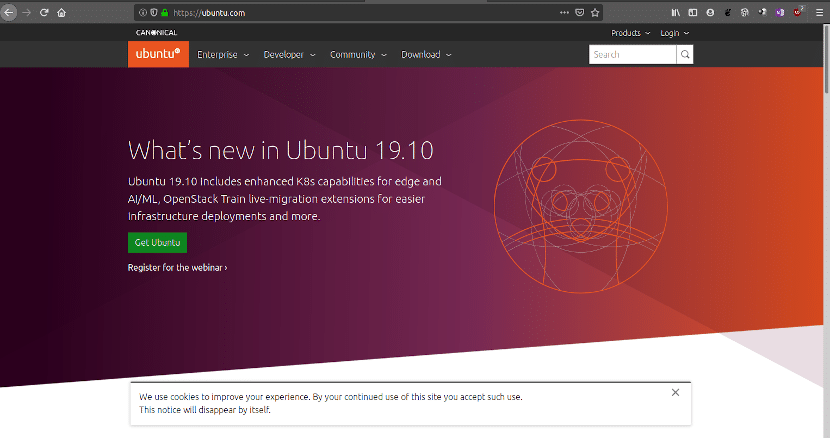
Ubuntu turns 15. It is rare that throughout that history no version has been named after Felis silvestris catus. Because like the domestic cat, You either love it or hate it. But, no linuxero is indifferent
It was on October 20, 2004 that an email on the mailing list announced the availability of the first version with these words:
The warm-hearted warthogs of the Warty team are proud to present the first version of Ubuntu
.
In that same email, the characteristics of the distribution were described.
Ubuntu is a new distribution de Linux whate brings together the extraordinary magnitude of Debian with a quick and easy installation, regular releases (every six months), a tight selection of excellent packages installed by default
and a commitment to security updates with 18 months of technical support for each version.
A service was also started that would be key to the popularity of the distribution. They would send you one or more CDs anywhere in the world totally free. It was a time when not everyone had Internet and those who did probably used a limited or low speed data plan.
Ubuntu turns 15. Some milestones in its history
The next version came in April 2005 and was named "Hoary Hedgehog." This version was enriched and improved by user comments on the website.
We had to wait until 2006 for two important milestones to happen: The first version of extended support appears and I become a Linux user.
Version 6.06, codenamed "Dapper Drake" was the first long-term supported release of Ubuntu. From that moment on, the extended support versions have three years of support for the desktop versions; Y five years of support for server versions. According to the philosophy of the project, these versions continue to be free.
Beyond the joke above, of considering my arrival to Ubuntu a milestone, let me recall my personal experience. Dapper Drake was my third Linux distribution in 3 days. As a good unconscious it occurred to me to go from Windows to Linux without scale. I formatted the disk and downloaded a minimal Debian image. The installation failed.
In a cyber café I looked for an alternative and got down Knoppix. With Knoppix in live mode, I burned an Ubuntu cd so I could install my first Linux distro.
Ubuntu at that time it was easier than other distros, but it wasn't that easy. Most of the websites used Flash, or ActiveX or they just didn't let you navigate with Firefox. Although there were no streaming services at that time, what Pablinux tells what about Disney +, it happened to us with a good part of the sites.
Since OpenOffice's compatibility with Microsoft's proprietary formats was poor, the repositories included document viewers created by Microsoft that ran under Wine.
Allow me a moment of tribute to Automatix. This tool, reviled by free software purists, it made it easy for users to install multimedia codecs, Adobe's Flash player, and other proprietary software.
Unity, the enemy of the people
The history of Ubuntu was full of controversy. Perhaps the biggest was triggered by Unity.
By 2010, the IT industry began to think beyond computers. Not only were phones getting smart, but televisions and other gadgets like home appliances were too.
Note: In the original wording of the paragraph it said 2016. Thanks to the reader Pietre for realizing the error.
To meet that challenge, the race for convergence began. Canonical launched two projects; Mir and Unity.
Mir was a graphic server that was to replace the venerable X11 with the possibility of adapting the display depending on whether the device it worked autonomously or connected to a monitor or keyboard. Unity was planned as a converged desktop that allowed access to online content from desktop panels. Through crowdfunding Canonical, the company behind Ubuntu, wanted to make a phone / computer hybrid, but could not find the necessary funds.
In my opinion, the first version of Unity was great. But since its launch in Ubuntu 12.04 it has been losing functionalities. The developers bet everything on a version that never materialized and that today continues as a community project Independent.
But, while Canonical's attempts to enter the market for phones (with third-party hardware vendors) and televisions failed, the corporate market was beginning to be profitable. Canonical's technical support was significantly cheaper than Red Hat's, and their cloud solutions were equally robust.. It also achieved good penetration among the nascent Internet of Things industry.
For 2018, Ubuntu re-released a version with Gnome as the default desktop, and Mir developers are looking to integrate it into Wayland, another graphical server looking to replace X11.
The only thing we have left, for now, of that rebellious and innovative Canonical that left no one indifferent, are the Snap packages. But who knows for how long. The internet millionaire who took a vacation to the space station is now approaching his fifties. And your company will go public at any time.
Like people, companies have the time to mature.
You made me remember my walk less deep and wide but just as clumsy in my beginnings with linux than it was with ubuntu, when reading automatix, something in my head said to this I know him but I do not know where, search and wikipedia I finished doing remember that those times, I even still have an original copy on CD that a friend gave me, it was one of the first versions. I distance myself when I get that desktop called unity, I tried to try with kubuntu but for other reasons my running in linux stopped, but we still have to recognize that ubuntu is a distro that has helped linux reach more people
Thanks for your comment